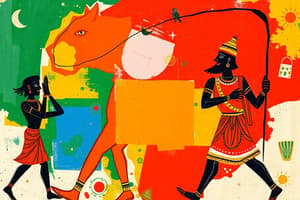Podcast
Questions and Answers
Which two major cities were part of the Indus Valley Civilization?
Which two major cities were part of the Indus Valley Civilization?
- Delhi and Agra
- Benares and Cuttack
- Pataliputra and Ujjain
- Harappa and Mohenjo-Daro (correct)
What significant development occurred during the Vedic Period?
What significant development occurred during the Vedic Period?
- Establishment of the Maurya Empire
- Development of the Vedas (correct)
- Creation of the Taj Mahal
- Invention of zero
Who founded the Maurya Empire?
Who founded the Maurya Empire?
- Ashoka
- Babur
- Akbar
- Chandragupta Maurya (correct)
Which empire is associated with the Golden Age of India?
Which empire is associated with the Golden Age of India?
Which architectural monument is associated with the Mughal Empire?
Which architectural monument is associated with the Mughal Empire?
What major event led to the establishment of direct British control over India?
What major event led to the establishment of direct British control over India?
Who was the first Prime Minister of independent India?
Who was the first Prime Minister of independent India?
Which event marked the partition of India in 1947?
Which event marked the partition of India in 1947?
Flashcards are hidden until you start studying
Study Notes
Ancient India
-
Indus Valley Civilization (c. 2500–1900 BCE)
- Major cities: Harappa, Mohenjo-Daro
- Urban planning, drainage systems, and trade networks.
-
Vedic Period (c. 1500–500 BCE)
- Arrival of Indo-Aryans; development of Vedas (sacred texts).
- Social structure: Varna system (Brahmins, Kshatriyas, Vaishyas, Shudras).
Maurya and Gupta Empires
-
Maurya Empire (322–185 BCE)
- Founded by Chandragupta Maurya; significant rulers include Ashoka.
- Spread of Buddhism; Ashoka’s Edicts promoting non-violence and Dharma.
-
Gupta Empire (c. 320–550 CE)
- Golden Age of India: advancements in science, mathematics, and art.
- Notable achievements: invention of zero, significant works in astronomy.
Medieval Period
-
Delhi Sultanate (1206–1526)
- Established by Qutb al-Din Aibak; Islamic rule introduced in northern India.
- Cultural synthesis: Indo-Islamic architecture (Qutub Minar, Red Fort).
-
Mughal Empire (1526–1857)
- Founded by Babur; significant rulers include Akbar, Shah Jahan, Aurangzeb.
- Cultural and architectural achievements: Taj Mahal, Persian art influences.
Colonial Period
-
European Exploration and Colonization
- Portuguese first to arrive (Vasco da Gama, 1498); followed by British, French, and Dutch.
-
British Raj (1858–1947)
- Established after the Sepoy Mutiny (1857); direct control over India.
- Economic exploitation, introduction of railways, and education systems.
Independence Movement
-
Key Figures
- Mahatma Gandhi: Nonviolent resistance, civil disobedience.
- Jawaharlal Nehru: First Prime Minister of independent India.
- Subhas Chandra Bose: Advocated for armed resistance against British rule.
-
Major Events
- Indian National Congress formation (1885).
- Salt March (1930), Quit India Movement (1942).
Post-Independence
-
Partition (1947)
- Creation of India and Pakistan; communal violence and mass migrations.
-
Constitution (1950)
- India becomes a sovereign republic; fundamental rights and democratic framework established.
Contemporary India
-
Economic Reforms (1991)
- Liberalization, privatization, globalization; transformed economy.
-
Nuclear Power (1998)
- India conducts nuclear tests, asserting itself as a nuclear power.
-
Current Challenges
- Socio-economic disparities, communal tensions, political dynamics.
Indus Valley Civilization
- Flourished between 2500 and 1900 BCE.
- Known for its urban planning and sophisticated infrastructure.
- Major cities included Harappa and Mohenjo-Daro.
- Advanced drainage systems and trade networks.
Vedic Period
- Spanning 1500 to 500 BCE.
- Marked by the arrival of Indo-Aryans.
- Led to the development of the Vedas, sacred texts.
- Established the Varna system, a social hierarchy with four classes: Brahmins, Kshatriyas, Vaishyas, and Shudras.
Maurya Empire
- Reigned from 322 to 185 BCE.
- Founded by Chandragupta Maurya.
- Significant rulers include Ashoka, known for his promotion of non-violence and Dharma.
- Spread of Buddhism throughout the empire.
- Ashoka’s Edicts established principles of peace and tolerance.
Gupta Empire
- Flourished between 320 and 550 CE.
- Considered a golden age for India.
- Significant advancements in science, mathematics, and art.
- Invention of zero and contributions to astronomy.
Delhi Sultanate
- Established in 1206 and lasted until 1526.
- Marked by the introduction of Islamic rule in northern India.
- Founded by Qutb al-Din Aibak.
- Developed a distinct Indo-Islamic architectural style (Qutub Minar, Red Fort).
Mughal Empire
- Founded by Babur in 1526 and lasted until 1857.
- Notable rulers include Akbar, Shah Jahan, and Aurangzeb.
- Known for its architectural achievements, including the Taj Mahal.
- Influenced by Persian art.
European Exploration and Colonization
- Portuguese were the first Europeans to arrive in India in 1498 (Vasco da Gama).
- Followed by other European powers including British, French, and Dutch.
- Led to the establishment of colonial outposts and trade networks.
British Raj
- Established in 1858 after the Sepoy Mutiny of 1857.
- British gained direct control over India.
- Period of economic exploitation, infrastructure development (railways), and introduction of education systems.
Independence Movement
- Indian National Congress was formed in 1885.
- Led by prominent figures like Mahatma Gandhi, Jawaharial Nehru, Subhas Chandra Bose.
- Marked by non-violent resistance, civil disobedience, and the adoption of armed resistance.
- Key events: Salt March (1930) and Quit India Movement (1942).
Partition of India
- Occurred in 1947.
- Led to the creation of India and Pakistan.
- Caused communal violence and massive population displacements.
Post-independence India
- Adoption of a constitution in 1950.
- Established India as a sovereign republic with a democratic framework.
- Focused on establishing fundamental rights and social reforms.
Contemporary India
- Economic reforms were implemented in 1991, resulting in liberalization, privatization, and globalization.
- India became a nuclear power in 1998 after conducting nuclear tests.
- Contemporary India faces challenges such as: socio-economic disparities, communal tensions, and complex political dynamics.
Studying That Suits You
Use AI to generate personalized quizzes and flashcards to suit your learning preferences.




